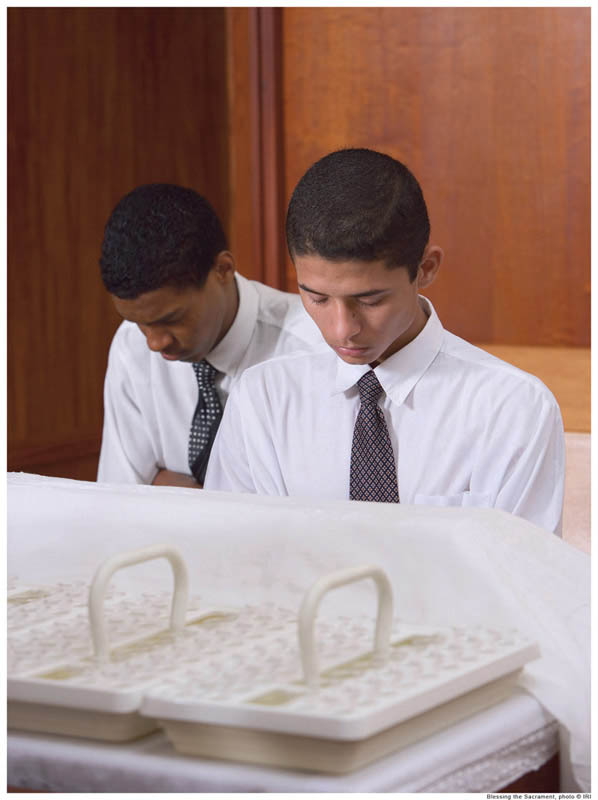As you start looking around to see what churches are out there, you’ll need to find out what each one believes. How do you find that out?
Today, we have more sources for information than ever before. You can put a religion’s name into the search engines and come up with millions of links that promise to tell you everything about that religion. The library will have many books on most religions. People you know will have information. The problem is that the information in all these sources will conflict. How are you supposed to get at the truth?
Imagine someone wanted to write a book about you. They contact you and ask you for the best sources to learn about you. What sources are you going to send them to? Will you ask them to interview you personally, since you know yourself better than anyone else? Will you send them to your friends? Will you suggest they only interview your enemies?
Oh, probably not that last one, right? Why not? If someone doesn’t like you, they’re going to only tell bad things about you. Most likely they will lie about you or twist good things around to make them sound bad. An enemy might take things out of context. For instance, suppose you said, “I hate when our football team loses.” An enemy might tell that writer you said, “I hate…our football team.” Yes, you said all those words, but the enemy left out some words, causing the whole meaning to change. If people believe your enemy, though, you’re going to have a pretty miserable year in school, gaining a reputation for having no school spirit.
So, you aren’t going to send your biographer to your enemies. You’re going to ask her to talk to you and maybe to your friends. Now, you’re an honorable person and you know that Bible verse about treating other people the way you want to be treated. That means if someone were writing about someone else at school and you were asked who the biographer should talk to, you’d send her to nice people or to the subject of the book, right?
The same goes for learning about religions. When I was a teenager, I was in the process of trying to choose a church. If I went to a church and they spent all their time bashing other religions, I left and didn’t come back. I wanted a church so complete and rewarding they didn’t have time to talk about other churches. I wanted one that focused on itself and God and Jesus. Since the Bible says not to treat others badly, I didn’t want a church that had classes about other religions and used that time to present those religions badly. I wanted them to be too busy teaching about themselves. I also wasn’t interested in spending my days in a gossip club, which is what those classes felt like to me.
I decided that when I wanted to learn about a religion, I would go right to that religion. I’d listen to what they teach their own members in classes, read their own books, and study their own scriptures. If they really teach that to their members, then that is what they believe. To me, that was the Christ-like way to learn about a religion. It was treating the religion the way I would want to be treated.
With the Internet, this is easier. I pretty much had to visit every church to find out what they believe and to get their books. Today, most religions have a website you can visit to learn what they believe. Sometimes they have websites for people who are that religion and another for people who aren’t, and you can visit both. Good members of those religions often have personal websites sharing their beliefs. If you know a member of the religion you’re interested in, you can talk to them about their beliefs to see how it all works out in practice. If they have missionaries, you can meet with those missionaries, and of course, you should attend their meetings.
Let’s say you’ve decided to look into the Mormons—maybe that’s why you came to this website. That means you’re already on the right track, since this is an unofficial website about Mormons by real Mormons. It’s even meant especially for teens. But let’s look at some of the other ways you would want to learn about the Mormons:
Go Online
The Mormons have a website for people who are not Mormon but want to learn more. This is a good way to start since it will assume you don’t know anything and will give you the basics. Often, it’s hard to understand a certain teaching until you have the proper background to understand it. The site is called Mormon.org. You’ll find videos, articles, answers to questions, answers from ordinary people with their own experiences, even a chat room. The chat room isn’t for arguing religion. It’s for asking serious questions from people really trying to learn the truth about Mormons.
Next, you’ll want to visit the website the Mormons created for their own members. It is called LDS.org. LDS is an abbreviation for Latter-day Saint. The full name of the Mormon Church is actually The Church of Jesus Christ of Latter-day Saints. Mormon is only a nickname based on the Book of Mormon, a companion book to the Bible. On this official website, you’ll find all the things Mormons teach their own members. The site even has the lesson manuals used in class. You can go there and read what a Mormon teenager is going to be taught in church on Sunday. There is a section of the website just for teens, also, so you can look for information specific to your life.
Meet a Real Mormon
This is a good time to find a real Mormon to talk to. Ask around your school and someone will know a Mormon. You want a Mormon teenager who goes to church regularly and who really believes what her church teaches and who tries to live what she’s taught. That lets you see how living like a Mormon affects a person. She can give you personal answers to your questions, based on real experiences. Sometimes it just makes more sense when you hear it from a peer.
Read the Book of Mormon
Get your hands on a copy of the Book of Mormon. If you found yourself a real Mormon to talk to, she can get you one. (She can get it free from church, so you won’t have to pay for it unless you want to buy a nicer copy.) If you’ve never read the Bible you might find the reading a little tricky, but it’s actually easier to read than the Bible. I’ll do a post on how to read the Book of Mormon next, but in the meantime, if you find something you don’t understand, mark it and ask a Mormon to explain it to you later. You can also go to the Mormon website and read one of the lesson manuals Mormons use to study the Book of Mormon. You’ll also want to read the Bible, since Mormons also use the Bible.
Meet With Missionaries
Your Mormon friend can arrange this or you can go to Mormon.org and request one. (Get your parents’ permission first because the missionaries will ask them for permission anyway.) You might have seen them around town. They often ride bicycles, although some drive cars. They wear suits if they’re men and dresses or skirts if they’re women and have name tags. Sometimes they knock on doors looking for people to teach but they like it best when people ask to meet with them. They have a short series of lessons they use to teach you about the Mormons in an organized way and they can answer your questions.
Visit a Mormon Church
You really have to go to meetings and classes to see how the Mormon Church works. Ask your Mormon friend to take you. If you’re meeting with the missionaries, they will meet you at the door when you arrive and help you meet other teenagers right away so you don’t have to try to go alone. Meetings are usually three hours—a sacrament meeting, which is the regular church service, and two classes. One class is Sunday School and you’ll go to class with both boys and girls your own age. For the other class, teen girls and boys meet separately. They also divide by age if there are enough teens. Here they learn how to apply the teachings of the Church and scriptures to their everyday lives.
Be sure to keep praying so God can help you recognize what is true. Next post we’ll learn about the Book of Mormon and then we’ll find out what to do if it seems like you’re not getting answers to your prayers. The last article will tell you what your life would be like if you became a Mormon.


